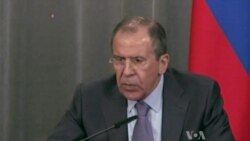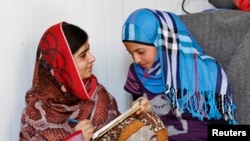JAKARTA —
U.S. Secretary of State John Kerry said Russia is enabling Syrian President Bashar al-Assad's campaign of "terror" against his own people. In Indonesia, Kerry called on Moscow to do more to help bring about a political solution to the conflict through talks in Geneva.
Secretary Kerry said Assad's forces continuing to barrel bomb civilians is evidence that the Syrian government is still pursuing a military solution to more than three years of violence.
"I regret to say they are doing so with increased support from Iran, from Hezbollah and from Russia. Russia needs to be a part of the solution and not be contributing so many more weapons and so much more aid that they are in fact enabling Assad to double down," said Kerry.
Efforts by international mediator Lakhdar Brahimi to find a political solution to the violence have so far failed, in part, Kerry said, because Russia is not doing enough to support these talks in Geneva.
"Russia, on several occasions, has stood up publicly with me or in other places and said they are committed to that transition government, to the Geneva Communiqué, and Geneva One. And yet we have not seen the kind of effort to create the dynamic by which that can be achieved," said Kerry.
Russian Foreign Minister Sergei Lavrov has said it is opposition supporters, among them the United States, who are delaying progress by focusing unrealistically on forcing President Assad from power.
"When all who backed the opposition taking part in this process urged to make the implementation of the Geneva Communiqué in all its entirety a subject of the talks they in fact had in mind one thing only - regime change," said Lavrov.
Unable to accomplish that, Lavrov said, opposition backers are now stalling.
"Under many different pretexts there are attempts to derail the Geneva peace talks. Initially they wanted to derail the peace settlement on the chemical weapons issue. When that failed, they started trying to politicize the issue of the humanitarian crisis," said Lavrov.
Opposition leader Ahmed Jarba is trying to increase his standing among rebel fighters inside Syria. However, the fractious groups behind him are divided over potential power sharing with members of the Assad government, said U.S. Institute of Peace analyst Steve Heydemann.
"The coalition itself does not have the kind of legitimacy that I think would permit it to speak on behalf of all groups which oppose the Assad regime," said Heydemann.
Experts point out that Assad supporters see little reason to negotiate in Geneva, as they believe government forces now have a military advantage over the rebellion.
Neither the government nor its opponents have yet agreed to return to peace talks. In this recess, Kerry said, the international community must determine how best to find a political solution to the violence. He also said that greater cooperation from Russia will be key.
Secretary Kerry said Assad's forces continuing to barrel bomb civilians is evidence that the Syrian government is still pursuing a military solution to more than three years of violence.
"I regret to say they are doing so with increased support from Iran, from Hezbollah and from Russia. Russia needs to be a part of the solution and not be contributing so many more weapons and so much more aid that they are in fact enabling Assad to double down," said Kerry.
Efforts by international mediator Lakhdar Brahimi to find a political solution to the violence have so far failed, in part, Kerry said, because Russia is not doing enough to support these talks in Geneva.
"Russia, on several occasions, has stood up publicly with me or in other places and said they are committed to that transition government, to the Geneva Communiqué, and Geneva One. And yet we have not seen the kind of effort to create the dynamic by which that can be achieved," said Kerry.
Russian Foreign Minister Sergei Lavrov has said it is opposition supporters, among them the United States, who are delaying progress by focusing unrealistically on forcing President Assad from power.
"When all who backed the opposition taking part in this process urged to make the implementation of the Geneva Communiqué in all its entirety a subject of the talks they in fact had in mind one thing only - regime change," said Lavrov.
Unable to accomplish that, Lavrov said, opposition backers are now stalling.
"Under many different pretexts there are attempts to derail the Geneva peace talks. Initially they wanted to derail the peace settlement on the chemical weapons issue. When that failed, they started trying to politicize the issue of the humanitarian crisis," said Lavrov.
Opposition leader Ahmed Jarba is trying to increase his standing among rebel fighters inside Syria. However, the fractious groups behind him are divided over potential power sharing with members of the Assad government, said U.S. Institute of Peace analyst Steve Heydemann.
"The coalition itself does not have the kind of legitimacy that I think would permit it to speak on behalf of all groups which oppose the Assad regime," said Heydemann.
Experts point out that Assad supporters see little reason to negotiate in Geneva, as they believe government forces now have a military advantage over the rebellion.
Neither the government nor its opponents have yet agreed to return to peace talks. In this recess, Kerry said, the international community must determine how best to find a political solution to the violence. He also said that greater cooperation from Russia will be key.






